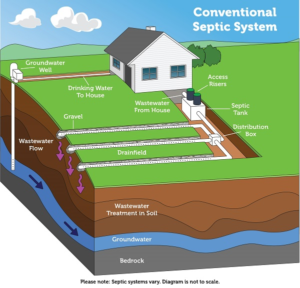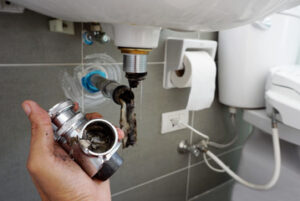A septic system treats wastewater from homes not connected to city sewer systems. It usually looks like a box underground with inspection pipes and manhole covers allowing pumping access.
Wastewater enters a septic tank where anaerobic bacteria break down solid waste into a sludge layer and a floatable scum layer. The oxygen-free environment also destroys disease germs in sewage. Contact Septic Tank Armadale now!

The wastewater from your home’s plumbing flows into your septic tank, usually concrete or plastic. The septic tank holds the wastewater for an extended period so that solid waste sinks to the bottom and floatable materials such as oils and grease rise to the top, where bacteria absorb them. The septic tank also digests the waste and separates out the liquid wastewater, which is then discharged into the drain field’s soil.
Unlike sewer pipes, which are exposed to the elements, septic tanks are designed for underground installation. They’re typically large, rounded tanks of concrete or polymers that look a little like giant garbage cans. They have one end connected to the inlet wastewater pipe and the other connected to a septic tank baffle. The baffle is a partition wall that separates the different compartments of the tank and helps keep sludge and scum away from the wastewater outlet.
A septic system that’s not pumped regularly risks overflowing into the septic tank and then the absorption field, which can expose people to disease-causing organisms from sewage. It’s important to have a professional plumber inspect and pump your septic tank at least once every three to five years.
Occasionally, you may notice a foul odor from the drains in your home, indicating that your septic tank needs to be pumped out. You should also watch out for slow-to-dissolve diapers, coffee grounds from a heavy use of the garbage disposal and synthetic fabric lint from washing machines (which clog the drain field). It’s also a good idea to avoid household chemicals such as disinfecting cleaners that kill bacteria and prevent the septic system’s natural process from working.
Some homeowners incorrectly assume that if they haven’t had any problems with their septic systems, they don’t need to have the tank pumped. However, that’s a big mistake. Even without any signs of a problem, the septic tank should be pumped out every three to five years to ensure that the solids don’t overflow into the absorption field and then into the home. Having your septic tank pumped regularly can also extend its lifespan.
Absorption Fields
A septic system’s absorption field is where the final treatment of sewage occurs. The soil in the absorption field helps to destroy pathogenic organisms, aerate and degrade organic matter, treat the wastewater and make it safe for groundwater. The nutrient rich effluent then replenishes the soil and recharges ground water aquifers. This eliminates the need for capital intensive centralized treatment systems that are high on energy requirement.
Once the septic tank performs its primary treatment, the wastewater enters the absorption field, which is made up of a network of perforated pipes buried in trenches, surrounded by gravel, sand and soil. The perforated pipe allows the sewage to seep into the soil, where natural processes break down harmful contaminants before they return to the groundwater supply.
To help prevent clogs, the inlet and outlet tees (shown above) are designed to keep the scum layer from flowing into the sewage tank or out of the absorption field. The baffle walls or T-shaped inlet/outlet in your septic tank also help prevent the escape of solids into the absorption field. This is because these solids, if they go into the absorption field, can quickly clog the drain field.
The perforated pipe in the absorption field should be sized to allow for at least 2 – 4 feet of unsaturated soil layer to treat the wastewater before it is added to the groundwater supply. The soil in the absorption field should be able to handle a minimum of 100 gallons of wastewater per day.
The absorption field may be arranged in either trenches or beds. Trenches work best on flat and sloping sites, while beds are more suitable for hillsides. In both cases, the septic tank should be sized to handle the maximum sewage load generated by your home. To avoid overloading the absorption field, be mindful of water usage, install water conservation devices (such as low-flow toilets and faucet aerators) and schedule regular inspections.
Pumps
In a septic tank system, naturally occurring bacteria and gravity help separate the waste into layers. The heaviest waste, called sludge, sinks to the bottom of the tank, while lighter fats, oils and proteins form the top layer known as scum. The liquid wastewater in the middle, called effluent, is then discharged into the drain field for final treatment. The pump is responsible for getting this fluid to the drain field, which is why it’s important that your septic tank be pumped regularly.
When your septic tank needs to be pumped, it’s important that you hire a professional for this task. They will locate the septic tank and using specialized equipment, remove the lid and insert a vacuum pump to suck up any liquid, solid waste or sludge that is inside. Once the tank is empty, they will clean out all of the filters and outlets that connect to the septic tank. They will also check the septic tank for any signs of leaks or problems with the tank itself, the pipes and the absorption field.
During the pumping process, someone will stand near the tank to use a tool called a muckrake to break up sludge and scum so that it can be removed more easily. They may also stop pumping from time to time to listen to the septic tank and observe how the septic system is functioning overall. This can let them know if the septic tank is working well or if it’s time to replace it.
The pump is a very important part of your septic tank and should always be maintained and repaired properly. The most important factor in selecting a pump is its horsepower, or how many gallons it can move per hour. This helps determine how quickly the septic tank can be pumped and how much waste it can handle.
The septic tank pump must be properly installed to ensure the safety of those who work on it and to protect the septic system from premature failure. In addition, the proper placement of risers from the septic tank access ports and inspection ports is important. These risers should be securely fastened to the soil and clearly marked so that they can be easily located in future cleaning and maintenance.
Inspection Ports
Septic tanks are a common part of residential sewage treatment. While they are most prevalent in rural areas, some urban and suburban homes also use them. If you have a septic tank on your property, then it’s important to know how to maintain it and recognize the signs of trouble.
Inspection ports allow septic system professionals to look inside the tank. They typically have a four-inch diameter hole in them. Once a probe has been inserted into the port, septic tank professionals can check the level of septic tank effluent and check for blockages in the septic tank outlet pipe. The septic tank outlet pipe is located at least six inches below the ground surface.
A probe is a long, thin rod that can be inserted into the septic tank inspection port. It is often made of plastic or metal and has a small opening at one end that allows it to be inserted into the inspection port. A probe can be inserted by hand or with a septic tank pumping truck.
When the septic tank is full, it can overflow into the absorption field. This can cause sewage to back up into the home, which is a dangerous and unpleasant situation. To prevent this from happening, you should have your septic tank inspected regularly.
During the inspection, inspectors will run water from sinks and showers to see how quickly it drains. They will also look for any backups or slow drainage, which can indicate problems within the pipes, septic tank, and leach field. Inspectors will also observe if there is any surface water or ponding around the septic tank and leach field.
If your septic tank is not properly maintained, it may require more frequent pumping or repairs. The best way to protect your septic system is to follow the recommendations in your septic tank inspection report and consult with a septic contractor.
Integrity Plugz® are a fire-resistant, resealable inspection port designed to provide large, safe, repeat access for monitoring your insulated assets. They are easily installed, reducing the need for fasteners on repeated inspections and mitigating the risk of water infiltrating insulation systems and causing CUI (Corrosion Under Insulation). The innovative design uses a Pitt-char XP puck that is mechanically fixed internally to the cap and is molded with a selection of fireproof soft materials.

